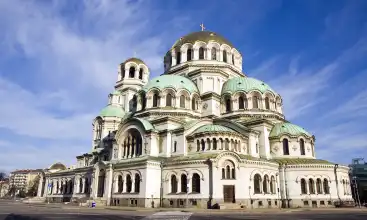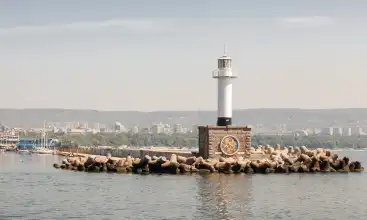- Online car rental since 2005

Car Rental Bulgaria
Save time and money. We compare the offers of car rental companies in Bulgaria on your behalf.
- Free cancellation Up to 48 hours prior to the scheduled pick-up time
- Best price guarantee Have you found a better price? Let us know and we will make you a better offer.
- 24000+ pick-up locations Locations around the world

Car Rental Bulgaria
EasyTerra Car Rental Bulgaria is an independent car rental comparison site. Our site compares prices from well-known car rental companies so that, as a customer, you can always reserve your car with us at a competitive rate.
Car rental offers in Bulgaria
Whether you're looking for a small rental car or a station wagon for the entire family, we will always have a suitable vehicle at the lowest price. Below are some examples from our selection in Bulgaria.

-
Top Rent-a-Car From€ 4 /day -
Green Motion From€ 10 /day -
Thrifty From€ 12 /day

-
Goldcar From€ 7 /day -
Europcar From€ 12 /day -
Keddy By Europcar From€ 12 /day

-
Alamo From€ 13 /day -
Enterprise From€ 15 /day

-
Autounion Car Rental From€ 9 /day -
Sixt From€ 10 /day -
Green Motion From€ 10 /day

-
Alamo From€ 10 /day -
Enterprise From€ 11 /day

-
Europcar From€ 15 /day -
Keddy By Europcar From€ 18 /day -
Green Motion From€ 49 /day

-
Autounion Car Rental From€ 12 /day -
Green Motion From€ 12 /day -
Sixt From€ 13 /day

-
Autounion Car Rental From€ 12 /day -
SurPrice car rentals From€ 34 /day

-
Thrifty From€ 16 /day

-
Low Cost Cars From€ 4 /day

-
Low Cost Cars From€ 5 /day -
Top Rent-a-Car From€ 5 /day -
Budget From€ 10 /day

-
Top Rent-a-Car From€ 7 /day -
Europcar From€ 16 /day -
Green Motion From€ 19 /day

-
Top Rent-a-Car From€ 5 /day -
Goldcar From€ 8 /day -
Green Motion From€ 11 /day

-
Top Rent-a-Car From€ 5 /day

-
Top Rent-a-Car From€ 10 /day -
Thrifty From€ 20 /day -
Hertz From€ 27 /day

-
Top Rent-a-Car From€ 5 /day -
Thrifty From€ 17 /day -
Hertz From€ 22 /day

-
Top Rent-a-Car From€ 5 /day -
Alamo From€ 11 /day -
Enterprise From€ 12 /day

-
Green Rent a car From€ 10 /day -
Hertz From€ 32 /day -
SurPrice car rentals From€ 57 /day

-
Low Cost Cars From€ 7 /day

-
Top Rent-a-Car From€ 8 /day

-
Top Rent-a-Car From€ 9 /day

-
Top Rent-a-Car From€ 8 /day -
Budget From€ 13 /day -
Autounion Car Rental From€ 18 /day

-
Top Rent-a-Car From€ 9 /day

-
Top Rent-a-Car From€ 13 /day -
Budget From€ 23 /day -
Autounion Car Rental From€ 25 /day

-
Goldcar From€ 9 /day -
Top Rent-a-Car From€ 13 /day -
Autounion Car Rental From€ 17 /day

-
Goldcar From€ 9 /day -
Europcar From€ 15 /day -
Keddy By Europcar From€ 16 /day

-
Alamo From€ 16 /day -
Enterprise From€ 18 /day -
Autounion Car Rental From€ 45 /day

-
Top Rent-a-Car From€ 8 /day -
Low Cost Cars From€ 11 /day -
Green Rent a car From€ 12 /day

-
Low Cost Cars From€ 10 /day

-
Top Rent-a-Car From€ 16 /day -
Hertz From€ 39 /day -
Sixt From€ 41 /day

-
Top Rent-a-Car From€ 11 /day

-
Low Cost Cars From€ 11 /day

-
Alamo From€ 17 /day -
Enterprise From€ 20 /day

-
Low Cost Cars From€ 14 /day -
SurPrice car rentals From€ 30 /day

-
Autounion Car Rental From€ 15 /day -
Keddy By Europcar From€ 20 /day -
Europcar From€ 21 /day

-
Alamo From€ 18 /day -
Enterprise From€ 19 /day

-
Low Cost Cars From€ 13 /day -
Top Rent-a-Car From€ 17 /day -
Keddy By Europcar From€ 33 /day

-
Top Rent-a-Car From€ 17 /day -
Europcar From€ 35 /day

-
Top Rent-a-Car From€ 17 /day -
Europcar From€ 35 /day

-
Top Rent-a-Car From€ 20 /day -
Sixt From€ 65 /day

-
Top Rent-a-Car From€ 23 /day -
Keddy By Europcar From€ 39 /day -
Europcar From€ 40 /day

-
Top Rent-a-Car From€ 20 /day

-
Enterprise From€ 23 /day -
Alamo From€ 24 /day

-
Enterprise From€ 23 /day -
Alamo From€ 24 /day

-
Top Rent-a-Car From€ 24 /day -
Sixt From€ 74 /day

-
Low Cost Cars From€ 22 /day -
Top Rent-a-Car From€ 23 /day -
Sixt From€ 55 /day

-
Top Rent-a-Car From€ 22 /day

-
Top Rent-a-Car From€ 26 /day -
Sixt From€ 61 /day

-
Top Rent-a-Car From€ 22 /day

-
Top Rent-a-Car From€ 26 /day

-
Top Rent-a-Car From€ 40 /day

-
Top Rent-a-Car From€ 39 /day

-
Top Rent-a-Car From€ 45 /day

-
Europcar From€ 50 /day -
Keddy By Europcar From€ 53 /day

-
Top Rent-a-Car From€ 22 /day

-
Top Rent-a-Car From€ 24 /day

-
Top Rent-a-Car From€ 43 /day

-
Top Rent-a-Car From€ 45 /day

-
Keddy By Europcar From€ 51 /day -
Europcar From€ 57 /day

-
SurPrice car rentals From€ 55 /day -
Europcar From€ 67 /day -
Keddy By Europcar From€ 72 /day

-
Keddy By Europcar From€ 55 /day -
Europcar From€ 60 /day

-
SurPrice car rentals From€ 66 /day -
Top Rent-a-Car From€ 108 /day

-
Europcar From€ 77 /day -
Keddy By Europcar From€ 80 /day -
Hertz From€ 89 /day

-
Low Cost Cars From€ 5 /day

-
Goldcar From€ 11 /day -
Europcar From€ 17 /day -
Keddy By Europcar From€ 17 /day

-
Top Rent-a-Car From€ 18 /day

-
Top Rent-a-Car From€ 11 /day

-
Low Cost Cars From€ 13 /day -
Top Rent-a-Car From€ 17 /day -
SurPrice car rentals From€ 57 /day

-
Europcar From€ 20 /day -
Keddy By Europcar From€ 23 /day -
Sixt From€ 41 /day

-
Top Rent-a-Car From€ 14 /day

-
Top Rent-a-Car From€ 17 /day

-
Top Rent-a-Car From€ 21 /day

-
Top Rent-a-Car From€ 21 /day

-
Top Rent-a-Car From€ 29 /day

-
Europcar From€ 49 /day -
Keddy By Europcar From€ 51 /day

-
Europcar From€ 52 /day -
Keddy By Europcar From€ 55 /day

-
Alamo From€ 60 /day -
Hertz From€ 71 /day -
Enterprise From€ 73 /day

-
Europcar From€ 60 /day

-
Alamo From€ 63 /day -
Enterprise From€ 76 /day -
Hertz From€ 80 /day

-
Keddy By Europcar From€ 63 /day -
Europcar From€ 71 /day

-
Keddy By Europcar From€ 67 /day -
Europcar From€ 74 /day

-
Top Rent-a-Car From€ 34 /day

-
Low Cost Cars From€ 7 /day

-
Top Rent-a-Car From€ 9 /day

-
Alamo From€ 16 /day -
Enterprise From€ 19 /day -
Keddy By Europcar From€ 20 /day

-
Alamo From€ 14 /day -
Keddy By Europcar From€ 15 /day -
Enterprise From€ 16 /day

-
Alamo From€ 17 /day -
Enterprise From€ 20 /day

-
Alamo From€ 16 /day -
Enterprise From€ 17 /day -
Thrifty From€ 20 /day

-
Enterprise From€ 17 /day -
Alamo From€ 17 /day

-
Top Rent-a-Car From€ 18 /day

-
Enterprise From€ 17 /day -
Alamo From€ 17 /day

-
Top Rent-a-Car From€ 13 /day

-
Top Rent-a-Car From€ 14 /day

-
Top Rent-a-Car From€ 19 /day

-
Top Rent-a-Car From€ 14 /day -
Green Motion From€ 47 /day

-
Top Rent-a-Car From€ 14 /day

-
Top Rent-a-Car From€ 20 /day -
Green Motion From€ 71 /day

-
Top Rent-a-Car From€ 14 /day

-
Top Rent-a-Car From€ 23 /day

-
Top Rent-a-Car From€ 23 /day
Popular cities in Bulgaria


Useful tips for a well-prepared trip
Which insurance should I choose, and what's the deal with the deposit? Read our articles with useful information and tips to ensure you choose the right rental car for you.
Car rental locations in Bulgaria
EasyTerra Car Rental compares rental car prices at the following destinations

Location information for Bulgaria
Bulgaria is best explored by rental car. EasyTerra Car Rental has over 7 pick-up locations in Bulgaria. This means there is always a pick-up location close to your destination.
Most popular car hire locations in Bulgaria
Introduction
Bulgaria is located in the southeast of Europe, at the Black Sea. The country is part of the Balkan region. What is more, the Balkan peninsula takes its name from a mountain range in Bulgaria. The capital of the country is Sofia. It has more than one million inhabitants, which also means that it is the country's largest city. Bulgaria has a population of 7.3 million people.
Visitors of Bulgaria can experience its history in picturesque towns like Veliko Tarnovo and Plovdiv. Beautiful monasteries and churches have been preserved and are awaiting new visitors in their natural surroundings. In this eastern European country delicious wines are in store for those who love wines. In summer the beaches at the Black Sea welcome the guests who seek warmth and relaxation. In winter sport-loving tourists can live it up at the ski slopes of the snow covered mountains.
Bulgaria is a country that struggles to keep pace with Western Europe. It is still a country that can be explored, before the rest of Europe will notice the splendid nature and rich history of Bulgaria.
History
Approximately six thousand years BC the Thracians inhabited the region that is now called Bulgaria. They lived here for many centuries, but were conquered by the Macedonians in 345 BC. This foreign domination lasted for fifty years. Thereupon the Romans entered the region in 72 BC. It took them one hundred years to submit the Thracians. Goths, Vandals and Huns too did their best in the following centuries to get hold of the region. Somewhere in the fifth century AD the Slavs arrived in Bulgaria. Another two hundred years after this the Bolgarians, also known as the Proto Bulgarians, got hold of the region. They entered the region from Central Asia. The people mixed with the Slavic people. Under the guidance of Khan Asparuch the first Bulgarian Empire was founded by this people in the seventh century AD.
During the year 865 Tsar Boris I tried to keep his empire together and unite its people by embracing Christianity. From that moment on the Bulgarian Empire was Christian. Churches and monasteries were founded.
Around the year thousand the Byzantines had seized power. In 1185 however, the Byzantines were thrown out of the country and the Second Bulgarian Empire was founded. The empire survived until the fourteenth century. Then the Ottomans came and conquered the entire Balkans within thirty years. Many churches and monasteries were closed.
Bulgarian nationality was not lost under the rule of the Ottomans. An important nationalistic revival occurred in 1672. The Bulgarian monk Paisii Hilendarski had written a book and travelled across Bulgaria to read his history of the Slavic Bulgarian people to the illiterate people. This is how the forgotten fire of 'being Bulgarian' flared up again among the people.
Another person highly praised in Bulgaria is Vasil Levski. This nineteenth century revolutionary travelled to Romania, Belgrade and many other places to establish revolutionary cells against the Ottoman oppressors. In 1873 he got arrested and was hung in Sofia. That is why he didn't live to see the day that Bulgaria regained its self-government within the Ottoman Empire. Thirty years later, in 1908, Bulgaria became an independent kingdom.
The Ottoman influence had to be dealt with during the First Balkan War. This short war was very cruel. Eventually the Ottomans lost almost their entire European territory. The Second Balkan War followed the first one immediately. Bulgaria was forced to return the regions it had conquered before to the surrounding countries. During the summer of 1913 this Second Balkan War was ended.
In 1914 the First World War started. At first this war was understood to be a third Balkan war. When it became clear that there was more to it, it was given its present name.
After the Second World War Bulgaria ended up under the communist regime of the Soviet Republic. Bulgaria was the most prosperous country of the Eastern Bloc. In 1989 the country left its communist era behind and became a democratic state.
Society and culture
The country has more than seven million inhabitants. Remarkably, the number of Bulgarians is dropping. Three-quarters of the Bulgarians live in cities. By far most people are ethnic Bulgarians. Besides them a considerable minority Turks live in Bulgaria. There are also small groups of Roma, Russians, Armenians and Macedonians.
Officially, Bulgaria became an atheist country during the communist period. Today almost ninety percent of the Bulgarians is Bulgarian-orthodox. Around 250.000 Pomaks live in the Rhodope Mountains. The exact amount of Pomak people is unknown. Originally, Pomaks were Bulgarians who converted to Islam in the sixteenth century. On the whole, around thirteen percent of the inhabitants of Bulgaria is Muslim. Basically, these believers are Sunni Muslims, though over time the Islam underwent so many influences from Christianity that the religion is now indicated as Balkan Islam. In the nineties of the past century many Pomaks converted back to Christianity.
People in Bulgaria speak Bulgarian. This is a Slavic language written in Cyrillic. The Turkish and Roma minorities predominantly use their own language. Older people sometimes speak Russian as this was their second language. Some Bulgarians know a little French or German. In the tourist sector it is fairly common to know some English.
Political situation
Since 1990 Bulgaria has a representative democracy. The Prime Minister is head of the one-chamber-parliament. Elections for this National Council (Norodno Sobranie) which consists of 240 members, are held once every four years. The last elections were held in the summer of 2009. Once every five years there are presidential elections in Bulgaria. The people choose their president directly. In 2006 Georgi Parvanov has begun his second period of office. He is the first democratically chosen president of Bulgaria. The president and the National Council govern 28 provinces. These are subdivided into municipalities.
Since 1955 Bulgaria is a member of the United Nations. In 2004 the country joined the NATO. In January 2007 Bulgaria also became part of the European Union.
Economy
Bulgaria is the poorest country of the European Union. After the fall of communism the Bulgarian economy collapsed. Nonetheless, the economy has been improving over the last years. After World War II Bulgaria became industrialized under the influence of the communist regime. Important industrial sectors in Bulgaria are among others machine-building, metalworking and food-processing. Originally the agricultural sector was very important. A fifth of all laborers is working in agriculture. Grain, coleseed and tobacco are some of the crops cultivated on the farmlands. Vineyards are also found all over the country. The production of wine and traditional brandy is important for the Bulgarian economy. Bulgaria has privatized its economy after the collapse of communism. Until today however, Bulgaria's main trading partners are former Soviet states.
In Bulgaria people still pay with Lev. The intention is to introduce the Euro in 2011.
Geography and climate
On the crossroads of Europe and Asia lies the nearly 111 thousand square kilometers large Bulgaria. Bulgaria is the heart of the Balkan Peninsula. In the east the Black Sea borders the country. In the south lie Greece and Turkey, the gateway to Asia. Serbia and Macedonia demarcate the country in the west. Finally, the Danube flows as a natural border along the north side of Bulgaria. On the other side of the river lies Romania. From east to west stretches the Balkan mountain range. Bulgarians gave these mountains a different name. They call it the Stara Planina 'Old Mountain'. Another mountain range in Bulgaria is the Rhodopes. The main part of these mountains lies in Bulgaria, the rest of it lies in Greece. The highest peak is Goljam Perelik. It is 2191 meters high. Between the mountains there are cliffs with caves and natural springs. Mountain lakes and reservoirs may pop up around the corner of the cliffs. In the west are the highest mountains of the country. They are called the Rila Mountains. This National Park is located some hundred kilometers south of Sofia. It offers protection to various sorts of flora and fauna and also cherishes the Rila monastery. This orthodox monastery dates from the year 946 and is part of the World Heritage List of UNESCO. To Bulgarians it symbolizes the victory over the Turks.
Bulgaria's coastal line has beautiful spots to bathe in the sun and the sea in summer. The most important seaport is Varna. Between the mountains of the Balkan and the river Danube lies a fertile plateau. Besides the Danube, the Maritsa and the Strimon are important rivers flowing through Bulgaria.
Bulgaria has a Middle European continental climate. This means that the summers are warm and the winters cold. July and August are the hottest months of the year. In winter there is snowfall, especially in the mountains. The wettest period runs from April to June. The Black Sea has its own influence on the east of Bulgaria; the temperatures are more moderated here. Because of the Rhodope Mountains the moderate Mediterranean climate has no influence.
Traffic and infrastructure
Bulgaria is considered to be the artery between Asia, Europe and the Middle East. However, the condition of the roads is very poor. Inside the built-up area drivers may drive as fast as 50 km/h. Outside this area the maximum speed is 90 km/h. On freeways one may drive 120 km/h. Motorcyclists are allowed to drive respectively 50, 80 and one 100 km/h. Many freeways are still under construction. Because toll has to be paid for the Bulgarian roads, it is best to buy a blue or green emblem. Place-names and signposts are all in Cyrillic.
Trains are very punctual though not very comfortable. There are three types of trains: ekspresen (express), barz (fast) and patnicheski (slow). There is also a first and second class.
Buses go between all big cities. Villages are also connected to each other and to the cities by buses. Apart from the government issued bus company, there are also private companies. These have more comfortable buses. Besides this, seats can be booked in advanced. The even faster minibuses drive over smaller distances and can be recommended. In larger cities there are buses, trams and trolleys.
From Bulgaria there is not much traffic over sea going to neighboring countries. During the summer luxurious boats sail from Varna to Istanbul in Turkey, Odessa, Sevastopol and Yalta in the Ukraine and Sochi in Russia.
There are five international airports in Bulgaria. These are located near the cities Sofia, Varna, Burgas, Plovdiv and Gorna Oryahovitsa. It is also possible to fly from Sofia Airport to Varna Airport and back, or between Sofia and Burgas Airport.
Food and drink
In traditional taverns, called mehana, one enters an authentic atmosphere, often accompanied with waiters and waitresses in traditional clothing. Recommended entrées are for example topcheta supa, a cream soup with meatballs, tarator, a cold salad made of cucumber, yoghurt and walnuts, or shopska, a salad of cucumber, tomatoes, cheese and onion. Popular main courses are kebabche, kufte, and musaka. The first two dishes are very similar to each other. Both are made of grilled spicy minced meat. It is mainly the form that differs. Musaka is a traditional dish that consists of layers potatoes and minced meat. Finally, the Bulgarian cuisine has another two dishes that are worth tasting. Kavarma is made of meat and vegetables stewed in pottery. Plakiya is a dish made of fish and rice.
For quality wine at dinner you came to the right address in Bulgaria. There are five wine regions in the country. Winegrowers produce white as well as red wines. From the south are the most delicious red wines. Apart from the mountain regions, there are vineyards everywhere in Bulgaria. Bulgarian beer is also worth tasting. There are a number of national beers. Provincial breweries brew excellent beers which often taste even better.
Time zone
Bulgarian time is equal to GMT/UTC +2. In summer another hour is added for daylight saving time.
Accommodation
Hotels in Bulgaria have a classification system of one to five stars. At the Black Sea many of the hotels are closed during winter. In the ski resorts it is the other way around; hotels open their doors in winter.
Hostels are not easily found in Bulgaria. They are present, but there is no coordinating organization representing them or making them easily accessible. On top of this, they are oriented towards Bulgarians themselves. Tourists are therefore more or less forced to learn Bulgarian, or to find shelter somewhere else.
There aren't many camp sites in Bulgaria. Besides, one can find little comfort and luxury there. The camp sites are also not always located on beautiful spots. Between November and April most of them are closed. At the Black Sea some are opened from June till September.
Mountain huts are opened during summer. The ones close to ski resorts are also open during winter months. There is no need to book a place.
Some private persons offer rooms as well. The rooms are most of the time clean and comfortable. Sanitary facilities are usually shared.
External sources
For more information about Bulgaria, we recommend Google and the following external sources:
Practical information
-
CurrencyBulgarian lev
-
Driving directionRight
-
City speed limit50 km/h
-
Freeway speed limit90 km/h
-
LanguageBulgarian
-
Popular car categoryEconomy
What most people want to know
The following questions and answers are a selection of the most popular questions. If you do not find the answer to your question, have a look at the Frequently Asked Questions page or contact us.
- Hertz
- First Car
- Enterprise
- Thrifty
- Sixt
- Alamo
- Budget
- Europcar
- Autounion Car Rental
- Green Rent a car
- Green Motion
- FireFly Car Rental
- SurPrice car rentals
- CarRent.bg
- Goldcar
- Top Rent-a-Car
- wheego
- Easy Rent Bulgaria
- InterRent
- addCarRental
- NÜ Car Rentals
- Mex Rent a Car
- Low Cost Cars
- Zezgo
- Keddy By Europcar
- Goldcar Key'n Go
- Exer Rent A Car
- PriceCarz
- Right Cars
- Autojet
- Optimo Rent
- Carwiz rent a car
- Your Rent
- Movida
- Localiza Car Rentals
- Unidas
- National Car Rental
- Dollar Rent a Car
- Avis


